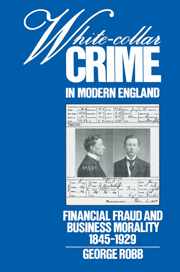Book contents
- Frontmatter
- Contents
- List of tables
- Acknowledgments
- Introduction: White-collar crime and the criminal “upperworld”
- 1 The new economy: transformation of finance and opportunities for crime
- 2 The Railway Mania
- 3 Banking and credit fraud
- 4 Stock fraud
- 5 Company fraud: promotion
- 6 Company fraud: management
- 7 Company law and the courts
- 8 Business ethics and professionalization
- Conclusion: Final considerations
- Notes
- Bibliography
- Index
6 - Company fraud: management
Published online by Cambridge University Press: 08 December 2009
- Frontmatter
- Contents
- List of tables
- Acknowledgments
- Introduction: White-collar crime and the criminal “upperworld”
- 1 The new economy: transformation of finance and opportunities for crime
- 2 The Railway Mania
- 3 Banking and credit fraud
- 4 Stock fraud
- 5 Company fraud: promotion
- 6 Company fraud: management
- 7 Company law and the courts
- 8 Business ethics and professionalization
- Conclusion: Final considerations
- Notes
- Bibliography
- Index
Summary
Once a company had passed through the uncertain process of promotion, it was still vulnerable to fraud on the part of those persons who managed the business for shareholders. The vast assets of large corporations proved too great a temptation for many of those whose job it was to manage shareholders' money. The divorce of ownership and control in public companies also placed directors in positions of almost unlimited power vis-á-vis shareholders. The license of directors was further bolstered by investors' ignorance regarding business matters, the inadequacy of auditing and the permissive nature of company law.
Directorial abuse of power was greatest when authority was concentrated in too few hands. Ideally, managerial authority was to have been divided among several directors who were to act as checks on each other. In practice, however, there was nothing to prevent directors from conspiring with each other to defraud shareholders. In other cases a single, strong personality might emerge as leader, riding roughshod over other directors who were too timid, ignorant or lazy to protest. Too many directors, especially those of the guinea-pig variety, viewed their positions as sinecures. It was thus fatally easy for an aggressive businessman like George Hudson to gain complete control over his fellow directors, who were quite content to draw their salaries and leave the work to someone else.
That such dereliction of duty on the part of directors eliminated an important safeguard against fraud was dramatized in a number of notorious cases. At the trial of the City Bank of Glasgow directors in 1878, it was revealed that only one director was well informed about the bank's affairs.
- Type
- Chapter
- Information
- White-Collar Crime in Modern EnglandFinancial Fraud and Business Morality, 1845–1929, pp. 125 - 146Publisher: Cambridge University PressPrint publication year: 1992



